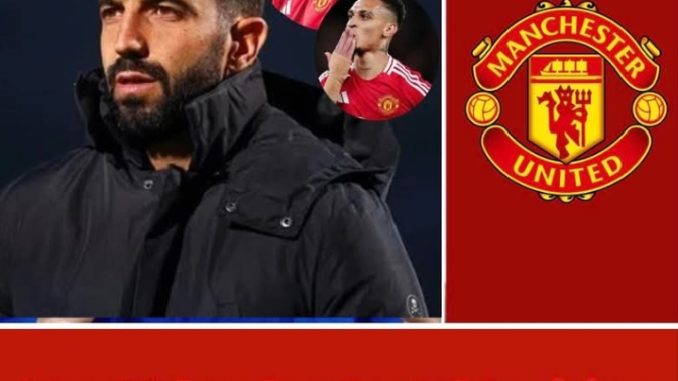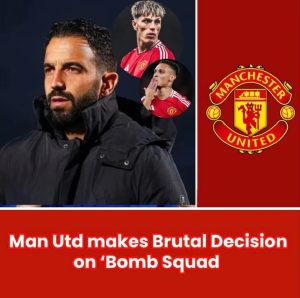
🚨🚨| Man United Makes Brutal Decision on ‘Bomb Squad’⤵️
Manchester United and manager Rúben Amorim have taken a decisive and uncompromising stand on their so-called “bomb squad”—a group of high-profile players now seen as unwanted and sidelined from first-team activities. Here’s the full rundown: what happened, why it matters, and what comes next for the players and the club.
—
🔥 What Happened: The Bomb Squad’s Exclusion
Excluded from the pre-season tour: Five players—Marcus Rashford (now on loan), Alejandro Garnacho, Jadon Sancho, Antony, and Tyrell Malacia—were conspicuously left behind when the team traveled to the U.S. for the Premier League Summer Series .
The four others continued training at Carrington—often after 5 pm—physically separate from the main camp .
This move underlines clearly that they are not part of Amorim’s plans for the upcoming season.
—
📣 Amorim’s Hardline Justification
Speaking in Chicago, Amorim confirmed his rationale in blunt terms:
He has set valuations for each player, and refuses to let any club lowball United .
If no acceptable bids materialize, they will remain Manchester United players—no apologies, no uncertainty .
He’s even ready to reintegrate them into the squad if required, particularly ahead of World Cup selections, citing increased internal competition as beneficial to the group .
In effect, United are telling the market: *pay full price or take nothing.*
—
📌 Why the Decision Is Brutal — And Strategic
1. Financial Survival and PSR Constraints
United are under severe financial constraints following losses exceeding £100m and mounting debt. The club desperately needs to sell assets to fund new signings like Matheus Cunha and Bryan Mbeumo and to stay PSR-compliant .
2. Send a Message on Culture
This is not just about finances. Amorim is reshaping the club with a strict merit-based culture. Players perceived as having attitude issues or inconsistent effort have been cut loose, regardless of status or previous contribution .
As defender Luke Shaw affirmed, this approach has transformed what he described as a once “toxic” environment into one built on clarity and collective buy-in .
—
🧠 Internal Reactions and Squad Cohesion
Backing from Within
Sha n Wes: internal figures—including players like Luke Shaw—have voiced support for Amorim’s disciplinary stance and “no stragglers” mentality. It’s seen as rejuvenating and unifying .
Pressure on The Market
By isolating the quartet, United send an unmistakable signal to buyers: don’t expect to negotiate hard; meet our terms or the deal won’t happen. This may deter potential adverse offers but also risks lowering demand as the window drags on .
—
⚽ Tactical Implications: What This Means on the Field
1. Cunha and Mbeumo as Arsenal Against Internal Discontent
United have added two new attacking signings to reinvigorate the squad: Matheus Cunha (£62.5 m) and Bryan Mbeumo (£71 m). Their presence mitigates the blow of losing experienced names like Rashford and Garnacho and reinforces Amorim’s 3‑4‑2‑1 system .
2. Depth vs. Disruption
If re-sold, the club’s depth could be weakened—but remaining sidelined players could disrupt team spirit if forcibly reintegrated. Amorim frames competition as healthy but must manage that risk if players return unmatched by form or focus.
—
💸 Market Value Reality Check
At their peaks, the bomb squad was collectively estimated at nearly £350 million. Today:
Garnacho was valued near £70 m in January but may now attract offers as low as £40 m .
Antony (£86 m signing) now reportedly unlikely to command more than £25–40 m .
Sancho, originally a £73 m purchase, sees limited interest and wage issues complicating deals .
Malacia currently draws interest from clubs like Celtic, likely at modest fees.
These figures underscore the potential financial hit if United are forced to accept suboptimal exits.
—
⏳ Timeline: From Fallout to Fallout
4335-2April 2025: Amorim publicly states no regrets in allowing Rashford and Antony to depart—emphasizing a longer-term rebuild over short-term goals 40.
4742-0Early July: Rashford completes a loan move to Barcelona, while Garnacho, Sancho, Antony and Malacia signal transfer intentions and are moved to isolated training status 42.
4954-0July 21–22: The squad travels to the U.S.—the bomb squad remains behind at Carrington 44.
5083-0Jul 25–26: Amorim formally confirms they’ll stay out unless buyers meet valuation; reintegration remains an option if not sold 46.
Jul 30: Luke Shaw publicly endorses the approach, calling it transformational in fighting negativity ` .
—
🚨 Potential Scenarios Moving Forward
✅ Scenario A: Sales Achieved at Fair Value
Bomb squad exits fund further key signings—possibly a striker or midfielder—and reinforce system stability.
Amorim proceeds with a streamlined, committed group unified behind collective goals.
⚠️ Scenario B: Bargain Deals or No Sales
United risk taking significant losses from transfers at reduced fees.
Amorim may reintegrate players—but must manage potential morale issues and ensure they compete under pressure.
Transfer targets become harder to reach without the financial flexibility needed.
—
🧾 Key Takeaways
1. Amorim’s decision is both tough and calculated—valued players margined off to force the market’s hand.
2. The club has financial urgency—offloading high earners is essential to support new recruits and adhere to PSR limits.
3. Cultural reinforcement is a priority: only players fully aligned with Amorim’s demands remain part of the first-team environment.
4. Luke Shaw and other insiders publicly back the approach, reportedly seeing it as a positive reset to alter previous toxicity.
5. With time dwindling, either United gets strong offers or faces internal friction—and potentially weakened depth or exposure to future unrest.
—
✍️ Final Thoughts
Manchester United’s treatment of the “bomb squad” marks one of the boldest internal decisions of Rúben Amorim’s tenure. He has cut a line sharply—actively affirming that only players aligned with his discipline and commitment levels will feature in his evolving project.
While the strategy is stark, it reflects a dual motive: financial prudence and cultural reset. With key transfer deals secured and new additions in place, Amorim has tilted the balance toward a functional, high-energy core—and signaled that even once-celebrated names must buy in or be bought out.
That said, the window closes in just over a month. As offers (or lack thereof) come in, the ultimate test will be whether these decisions yield economic benefit, sporting continuity, or unintended turbulence.
—

Leave a Reply